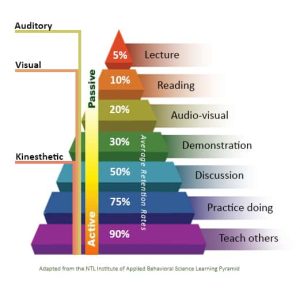Learning Through Experience [08-01-2023]

“Experience is the best teacher” is a commonly referred to phrase coined by none other than Julius Caesar. While it may have been appropriate in developing effective military strategies, its application in education is far healthier. As parents and educators, it is valuable to understand the power in fostering a learner’s ‘hands in the clay’ engagement with the world around them. The learning pyramid (image below) attributed to the NTL Institute of Applied Behavioral Science (HERE) suggests that the more active the learner is in the learning process the greater his/her retention rate is likely to be. While there is some contention within academia regarding the empirical accuracy of the percentages listed (the author suggests ignoring these), it is not difficult to find personal resonance with the suggestion that the more actively focused a learner is in the learning process the deeper the learning experience is.
The July 2023 edition of this series (HERE) provided a few ideas that could be used to pique readers’ interest in reading, this entry discusses how to build momentum on the heels of reading. Role plays are a great way to engage the reader in reflective dialogue about what has been read. Groups of students could create a 3D persona of their favorite characters within the story. This may involve selecting character identifiers (e.g. tone, familiar speech phrases, attitude, appearance, body posture, facial expressions…). They could then be asked to either recreate a scene from the story or portray (act out) how the character may respond to imaginary scenarios:
How would ____________(e.g. Piglet from Winnie the Pooh) perform as a substitute teacher in our class?
Another activity that students seem to enjoy is to create a bank of comprehension quiz questions about what has been read. Again, if this activity is done in small groups it is a more enjoyable task, and tends to be more engaging. This could then take the form of a round-robin quiz show, where each team takes turn reading out a question from their bank while the other teams have a designated period of time to come up with an answer. Prepare to be surprised at how masterful students can be in designing very difficult questions to stump each other! I’m sure many of the readers here will have other such class activities to share with the group, and I look forward to hearing of them as well!
Engaging students in collaborative experiences within the classroom environment is always encouraged; however, it is even better to enable this outside of the classroom where students may have a wider platform to be recognized for their capacity. Within the school community students can create a poster presentation exhibition highlighting their favorite story or even present information of interest (this could be accompanied by a multimedia presentation that viewers may view or live presentations). School assemblies are another great way to give students a chance to promote their favorite story through drama, multimedia, a brief documentary… One project that I assisted in conceptualization and production of, within the greater Macao community, was the “Books Alive” project series – a Contest and Summer Camp designed to promote reading among children and youth (HERE). The concept was very well received by key community stakeholders – Schools, Grassroots Community, Private and Public Sector enterprises – many of whom provided valuable forms of support and sponsorship, and was a truly empowering experience for the students and teachers who were directly involved. The model is easy to replicate and could be applied in your community as well.
I am confident many of the readers here have resources and strategies they use in assisting students to engage in meaningful reading experiences, which I hope are shared.
Any comments or reflections based on your own strategies for nurturing reading enjoyment are most welcome!
The next update will be published on 1 September 2023!
Stay blessed,
L. Malungu




It’s true that we learn better when we teach others.
I was always bad at math. But when I started teaching my kids, I found myself doing fractions in a jiffy.
And found myself wondering why was it so difficult for me when I was at school!
Thank you for sharing your valuable experience. There is most certainly power in consciously focusing our attention with the intent to provide clarity to another. I honestly believe educators (parents, teachers…) have the best opportunity to display the beauty of being human – uplifting oneself and others!